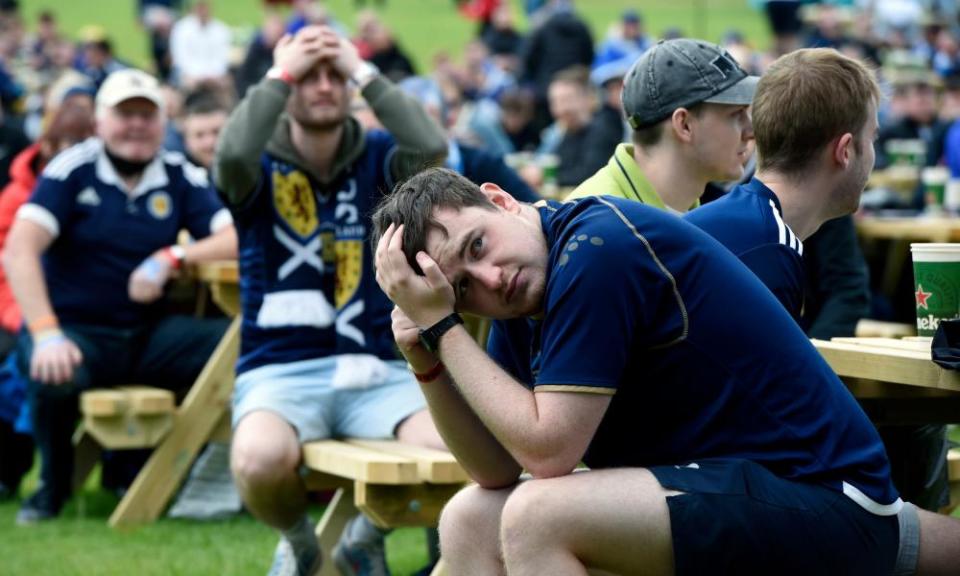Scotland’s disco-fuelled return fizzles out with Steve Clarke short of ideas

Somewhere along the road to Euro 2020 Steve Clarke and his players adopted Yes Sir I Can Boogie as their anthem and, in many ways, it has proved a great choice.
Yet while the 1977 Baccara hit is infinitely more uplifting than Flower of Scotland, a song including the lyrics “you wanna know if I can dance” and “I’m a sensation” could be construed as a slightly overconfident theme tune for a side competing in their first major finals for 23 years.
Related: Schick’s halfway line hit helps Czech Republic spoil Scotland’s party
Indeed for much of a cool, grey, breezy, June afternoon at Hampden Park, Scotland resembled a gawky teenager with two left feet and alarmingly stiff hips looking self-consciously uncoordinated beneath the unforgiving glare of a disco glitter ball.
In a contest that the Czech Republic initially appeared happy to make as scrappy as possible, Stephen O’Donnell seemed particularly shaky at right wing-back and Clarke evidently missed the left-sided defensive order customarily instilled by Kieran Tierney’s usual presence in the back three.
Knee trouble deprived Scotland of an Arsenal defender integral to their recent success and the outstanding Patrik Schick knew precisely how to exploit their new-found uncertainty and insecurity.
Before half-time had arrived, Scotland looked increasingly heavy-legged as they laboured to close down Jaroslav Silhavy’s players. They had begun to concede too many corners and, in the wake of one such partially cleared set piece, West Ham’s Vladimir Coufal was able to overlap down the right and cross invitingly for Schick.
The Bayer Leverkusen centre-forward duly seized the moment, intelligently finding a gap between Grant Hanley and Liam Cooper before planting an imperious header beyond David Marshall’s grasp. It permitted the tiny contingent of Czech Republic supporters tucked away in a corner of Hampden Park to finally make their voices heard.
Until then the vast majority of the 12,000-strong crowd had done their utmost to crush the spirits of Silhavy’s team courtesy of a deafening wall of noise many audiences four times the size would have struggled to replicate.

Before 10am on Monday, central Glasgow was awash with tartan-clad, sometimes kilted and often beery Scotland supporters. With Hampden’s capacity limited by coronavirus restrictions many were destined to watch the match on big screens erected in a fan zone patrolled by yellow-vested Covid marshals urging everyone to visit a specially parked virus-testing bus.
Back on the pitch, Clarke’s players faced a different type of test. After an opening period of tight margins and few chances – although Andy Robertson probably should have scored – Schick’s opener had challenged Lyndon Dykes and company to prove they were in the same attacking league.
Admittedly very briefly, they looked equal to the challenge. With QPR’s Dykes making an awful nuisance of himself as he pulled off a smart decoy manoeuvre, Jack Hendry’s curling shot struck the crossbar and Tomas Kalas was very nearly forced into scoring an own goal. But then David Marshall made one of those miscalculations guaranteed to destroy a goalkeeper’s sleep for months to come.
Marshall is not deployed as a sweeper keeper but, for some reason, he had strayed outside his penalty area when Schick stepped over the halfway line and instantly sensed opportunity. His second goal – and 13th in 27 international appearances – was a thing of exquisite beauty, worth replaying, endlessly, for years to come. The ball was already travelling at remorseless pace when it arced over Marshall but Schick’s stellar technique had ensured its 50-yard-plus trajectory contained sufficient bend and dip to eventually ensure it hit the top corner.
Download the Guardian app from the iOS App Store on iPhones or the Google Play store on Android phones by searching for 'The Guardian'.
If you already have the Guardian app, make sure you’re on the most recent version.
In the Guardian app, tap the yellow button at the bottom right, then go to Settings (the gear icon), then Notifications.
Turn on sport notifications.
With a sublime yet soul-crushing swipe of a boot, joy and optimism were all but erased from the stadium. The subsequent sight of John Carver, Clarke’s assistant, engaging in grim-faced, head-shaking technical-area conversation suggested the pair were running out of tactical buttons to press. Their side’s lack of attacking width must have been of particular concern.
Dykes missed a sitter, permitting Tomas Vaclik to stretch out his right foot and make a brilliant save that should never have been possible. It seemed to serve as confirmation that this most definitely was not Scotland’s day.
Indeed for those of a tartan persuasion, it was not only turning into the worst sort of warm-up for the date with England at Wembley on Friday but a cruelly anticlimatic ending to a long-anticipated party that never got going properly.
As the Czech Republic revelled in retaining a well-honed defensive shape, for the hosts a place in the knockout stages appeared as far out of reach as a quarantine-free summer holiday by the Mediterranean.
A voice on the public address system repeatedly reminded spectators to keep their masks on when exiting the stadium and, as a smattering of resigned boos greeted the final whistle, Clarke’s players must have longed for similar camouflage.
No longer the soundtrack of a charmed summer, the strains of Yes Sir, I Can Boogie suddenly seemed more cruel taunt than unofficial national anthem.

 Yahoo Sport
Yahoo Sport 





































